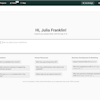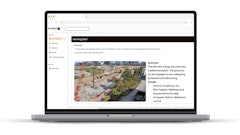When you win a bid on a large new project, it's easy to get caught up in the challenge of the job and the thought of resulting profits. As the economy has slowed, however, far too many in construction-and particularly in residential construction-have found themselves anything but excited by their financial circumstances. Some small business owners find themselves focused on new business and profits, without looking at the other important factors, such as the delicate balance between accounts payable and accounts receivable. The moment accounts receivable begin to lag, this change must be counterbalanced in accounts payable to maintain healthy cash flow. Otherwise, this situation can quickly undermine a business's financial standing-even when sales are strong.
Today's economy is decidedly more difficult to navigate than just a year ago, and various forces in play can conspire to knock a business off its feet financially. In addition to the changing real estate market, for example, every business is also feeling the effects of increased oil and fuel prices, whether directly or indirectly. These and other factors potentially add up to fewer customers, customers who pay more slowly, and higher expenses. The net result: cash flow concerns. In fact, while 46% of business owners last year said they were experiencing cash flow issues, today, 56% say they have cash flow worries, according to American Express OPEN's Small Business Monitor, a semi-annual survey of business owners.
Regardless of where the economy may take us, the savviest business owners will not only watch sales but will also shape up their practices in accounts payable and receivable. By keeping the following tips in mind, you can optimize your financial standing for a healthier business.
Get the most from your money
To keep your business's cash flow healthy, hold on to the cash you have as long as possible. Be sure that you're taking advantage of the terms that vendors offer, by paying bills as close to the due date as possible-but without paying late. Also consider approaching the vendors with whom you have the longest and best relationships to renegotiate terms that will allow you more time to pay. Extending terms just one extra week can have a positive effect on cash flow.
Another easy way to improve your cash situation through basic accounts payable practices is to use credit cards to delay payments. This practice can allow you to pay invoices just before they're due, and then gain extra time to pay, thanks to the terms of your credit card. Don't forget that some cards will also pay cash-back rewards.
Once you've worked out a strategy to delay payments as much as possible while still honoring your obligations, you'll also need to keep costs down. After all, the best way to hold on to money is simply not to spend it. Recurring costs are the real target to aim for. Do what you can to keep payroll as lean as possible by continually reassessing whether a project is appropriately staffed. Also try to keep your inventory of supplies as low as possible, without risking shortages. An overly large inventory needlessly overburdens cash reserves, tying up money you need for other, more pressing expenses.
And for the expenses you simply can't cut back on, such as materials for jobs, do whatever you can to delay purchases. Materials bought too far in advance end up needlessly tying up cash-especially when weather conditions or other unforeseen events delay construction.
Offer a variety of payment options
With a plan in place to hold on to your cash, you'll need to turn your attention to collecting payments as quickly as possible. Offering different payment options can help in this effort, but make sure you're offering the smartest options.
Next to cash, perhaps the easiest and most convenient option is to allow customers to use a variety of charge and credit cards. It's difficult to beat them when it comes to maintaining healthy accounts receivable. Unlike checks, you won't run the risk of a customer's overdrawn account, or have to wait for a check to arrive in the mail. For general contractors who are being paid directly by the customer, accepting credit cards sidesteps delays that occur when customers have problems sticking to the draw schedule because of issues with bank. And for subcontractors, credit cards make it easier to receive payments on time-even when the general contractor is experiencing delays in payment. Furthermore, individuals and companies often like to pay with credit cards because it may allow them to earn rewards points or accrue other benefits the card may offer.
Overhaul collections
To keep cash flow moving, it's critical to stay on top of collections well before payments are overdue. And even when payments are coming in on time, look for ways to improve your overall collections process by understanding your customers' billing preferences and procedures. Most small businesses can improve collections simply by attending to the basics. Take steps to keep all customer information up to date. By maintaining current telephone numbers and address information, you'll speed collections work and reach customers promptly. When dealing with businesses, be certain your invoice contains all appropriate information, such as your customer's purchase order number or your vendor number, and be sure to send the invoice to the appropriate contact. Wrong contact information or missing invoice information will only add more time to the collection cycle-and that's what whittles away at cash reserves.
Outsource accounts receivable
Bad credit can be contagious, so it's important to take steps to prevent bad customers from affecting your good credit. Protect yourself from late-payers or non-payers by putting a reputable intermediary in the middle. Hire or assign a reliable bookkeeper or accountant on a contract basis to handle accounts receivable functions. His or her job will be to approve credit, make collection calls, receive payments and make deposits. By taking this active step towards strong accounts receivable, you'll take a major step towards stronger cash flow. According to the recent Small Business Monitor, a more aggressive approach to collecting accounts receivable is the number-one tactic small business owners are likely to employ to improve cash flow.
Maintaining the delicate balance between accounts payable and receivable isn't necessarily easy, but with concerted effort and some common sense strategies, you can build a more solid financial foundation for your business. And with more cash on hand and greater peace of mind, you can focus on new and inventive ways to take on whatever the economy may bring.
David Shapiro is vice president for American Express OPEN, the nation's leading issuer of payment products for small business owners.



















